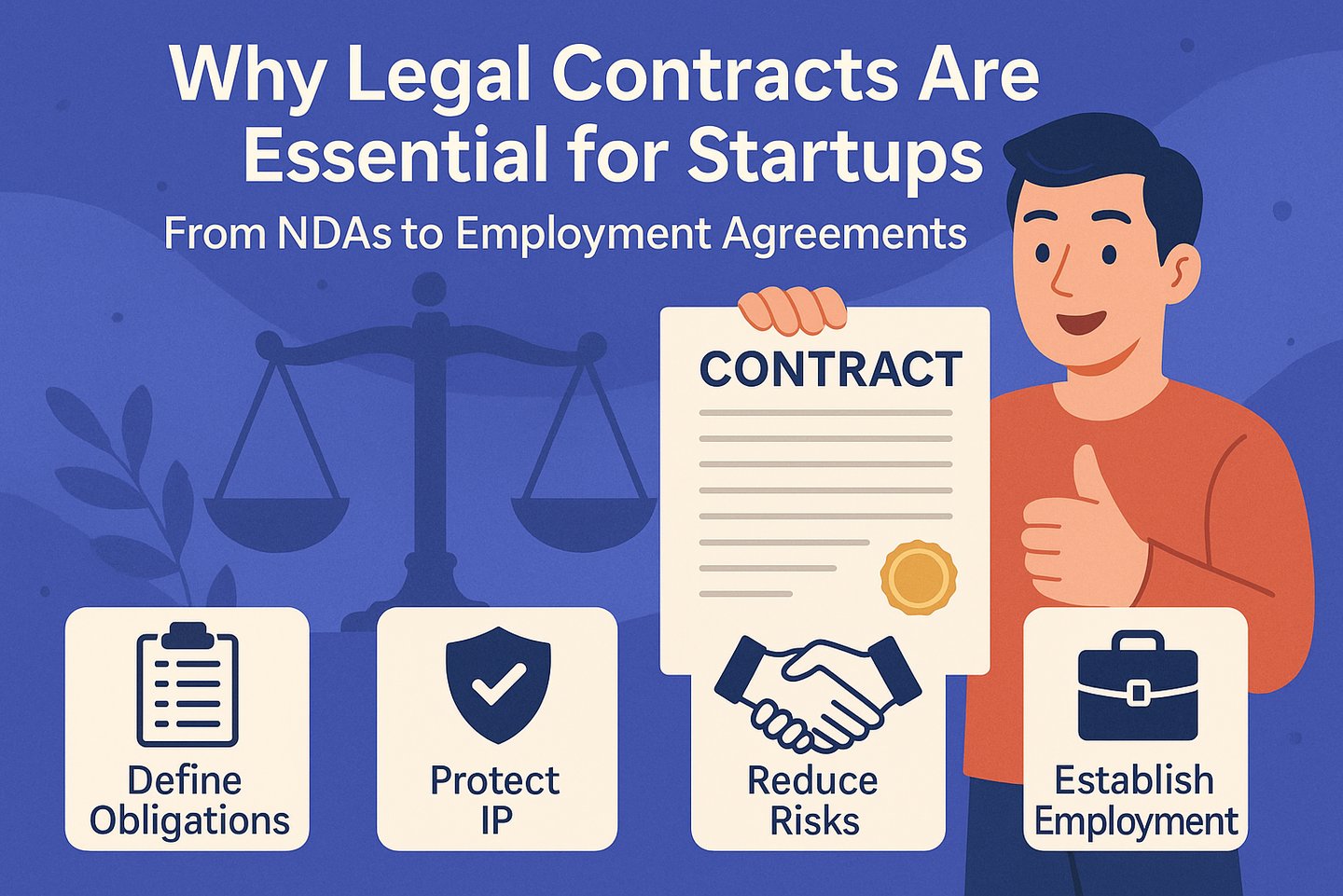Why Legal Contracts Are Essential for Startups: From NDAs to Employment Agreements
Legal contracts are vital for startups, providing essential protection, clarity, and credibility in business relationships. From NDAs to employment agreements, robust legal documentation safeguards innovation and lays the groundwork for sustainable growth.
CORPORATE LAWS
Prajul Mehta
7/11/20253 min read


Nowadays. Startups are considered the engines of ambition and innovation, but the journey to success is a risky road for a new concept, although many risks can be easily mitigated with the help of some well-crafted legal contracts. The importance of these Non-Disclosure Agreements (NDAs) cannot be undermined, since they play a very crucial role in any contract. From Non-Disclosure Agreements to Employment Agreements, everything is essential as they form the backbone of clarity, trust, and protection of startups.
The Role of Legal Contracts in Startups
Foundation for Business Relationships
These legal contracts help in laying down the groundwork for every key relationship that is required for a startup. A contract not only helps in formalizing and clarifying the terms of engagement with vendors, investors, customers, employees, and co-founders, but also this contract helps in establishing clarity and ensuring that everyone understands their roles and responsibilities with minimizing the possibility of misunderstanding or disputes.
Compliance and Credibility
Abiding by the legal requirements for any business is essential, as contracts help in easing up startups by complying with national as well as local laws, which also helps in mitigating regulatory penalties. Apart from this, having a strong legal documentation also enhances the credibility of a startup in the eyes of clients, investors, and partners.
Risk Mitigation
There is always uncertainty in the world of startups, since there is no rule of thumb to be followed. Here, contracts serve as a key tool for risk management, safeguarding against shortcomings and potential issues like IP theft, breaches of confidentiality, or disputes. A well-drafted contract helps in overcoming disagreements, establishes a clear foundation, and provides a clear basis for legal recourse if needed.
Types of Legal Contracts for Startups
Non-Disclosure Agreements (NDA)
The main purpose of designing NDAs is to ensure a startup’s confidential information, which may include its trade secrets, strategies, and other proprietary technology. NDAs ensure that the sensitive information relating to startups is not disclosed or misused in any manner.
When to Use:
During negotiations with investors, vendors, or collaborators
During product development discussions
During the hiring procedure and onboarding of new employees
Key Clauses
Definition of Confidential Information: Clearly outlines what information is protected.
Obligations of the Receiving Party: Specifies how the information should be handled.
Duration and Exclusions: Sets time frames and exceptions.
Remedies for Breach: The clause mainly emphasizes the details of the consequences if the agreement is violated.
Employment Agreements
The purpose of designing an employment agreement is to ensure that such an agreement defines the terms of employment, which cover the roles and responsibilities, benefits provided to employees, and termination conditions. These help not only in protecting startups and their employees but also in setting expectations for the business. It also includes clauses specifically for confidentiality and IP assignment as well. It ensures legal compliance with Labor laws and mitigates disputes.
Key Clauses
Job Title, Description, and Duties: Specifies the roles of the employee.
Compensation and Benefits: Details salary, bonuses, and other perks.
Leave Policies and Working Hours: Clarifies expectations for time off and attendance.
Confidentiality and Non-Compete Provisions: Protects the startup’s interests.
Termination and Dispute Resolution: Outlines the process for ending employment and resolving conflicts.
Why Startups Cannot Afford to Ignore Contracts
Avoiding Disputes
Ambiguity is a breeding ground for strife. By using written contracts, ambiguity is removed, which minimizes the likelihood of expensive legal disputes that drain resources and distract founders away from growing their company.
Protecting Intellectual Property
A startup's worth often lies in its ideas and innovation, which is why NDAs and IP assignment agreements are so important and need to be considered right up front. Without contracts, it is easier for employees, partners, or competitors to steal or misappropriate your ideas.
Attracting Investors
Investors will do extensive due diligence before they put any money into your business. A startup with solid legal details will be more likely to get additional funding because it demonstrates professionalism and reduces perceived risks.
Ensuring Smooth Operations
Contracts formalize ways of doing business. If you are clear with your contracts on everything from hiring to purchasing, it makes it much easier in the event of a dispute, so you can grow the business instead of dealing with unwarranted misunderstandings.
Best Practices for Startups Creating Legal Contracts
Write to Your Audience
Legal terminology creates confusion. Contracts should be written in plain language. Contracts should be objective and easy to read for all parties involved to ensure that everyone agrees.
Incorporate Each Relationship
There are no two business relationships alike. Contracts should reflect the specific needs and risks of each employee, partner, or transaction. Generic agreements that are one-size-fits-all all fail to protect you adequately.
Review and Update Your Contracts
Business needs and legal requirements routinely change over time. Startups should routinely review and update contracts to ensure they are up to date and enforceable.
Get Legal Advice
Legal templates can work for you, but it is incredibly important to hire competent legal professionals to assist you with unique relationships, especially those that you've created that are more complex or worth more money. Lawyers can uncover potential issues, create agreements that are extensive, and provide professional advice to best match your startup's circumstances.
In Conclusion, Legal contracts are much more than paperwork—they are strategic assets that will help your startup achieve success. From NDAs protecting your ideas to employment agreements establishing clear expectations, the expenditure of starting with proper legal documentation is going to be required in creating value for your startup.
